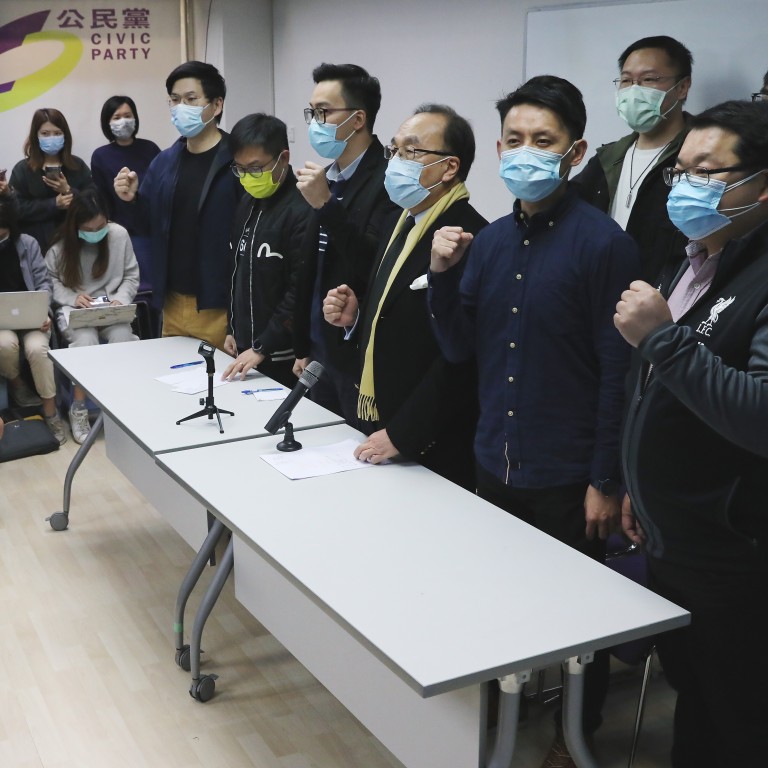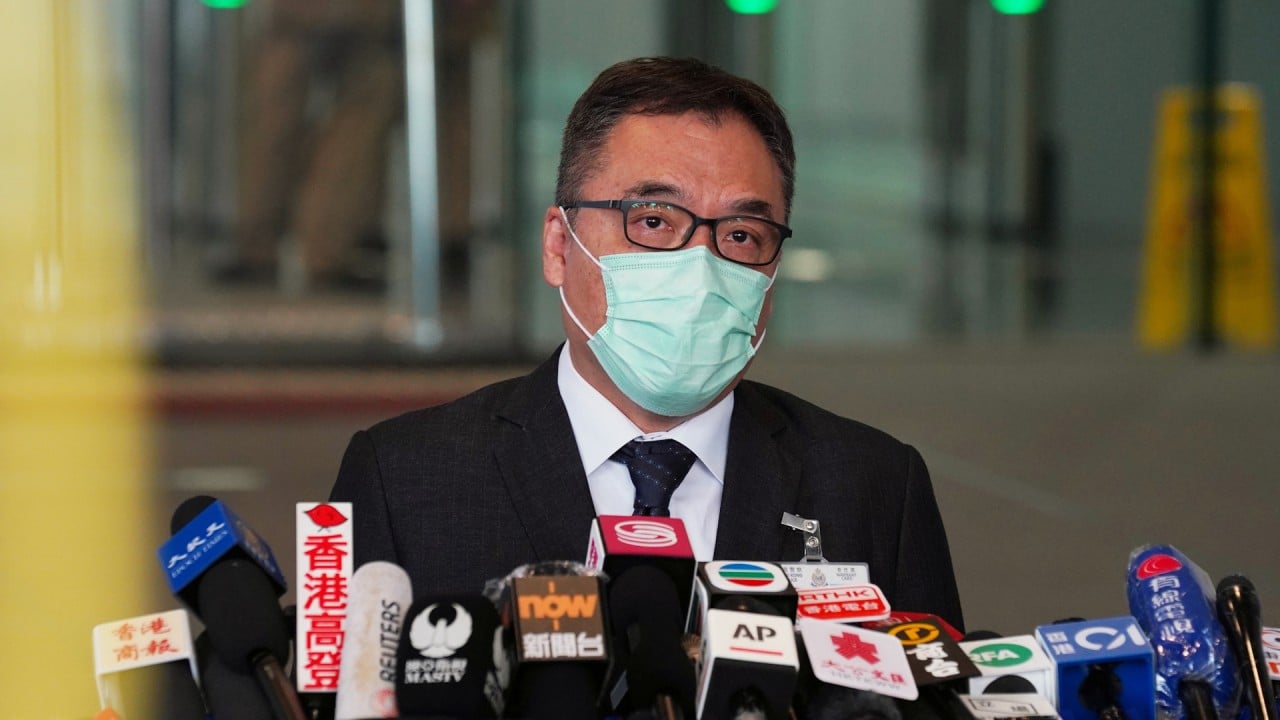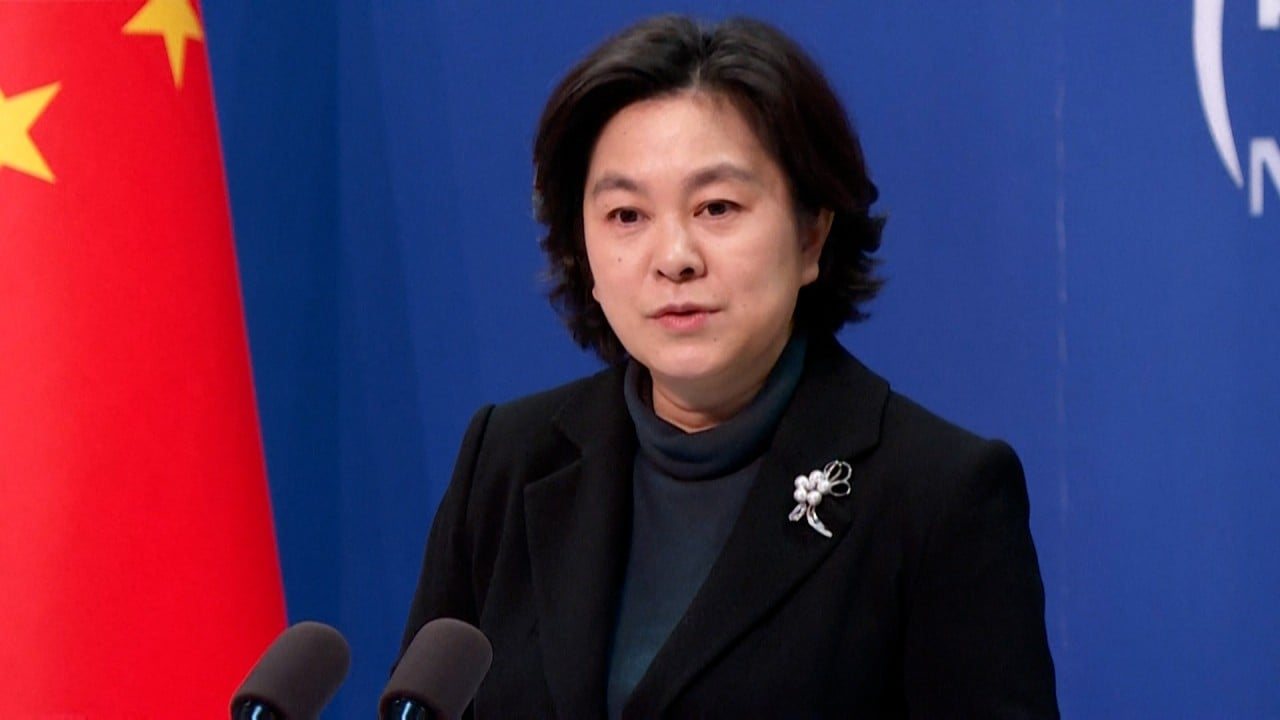
Hong Kong national security law: can opposition camp survive the crackdown, or are they on ‘road with no return’?
- The arrest of more than 50 members of the bloc has left the future of an already strained alliance further in doubt
- While some pro-Beijing figures say more moderate voices will emerge, other observers caution any successors will be too afraid to challenge the official line
The crackdown on the opposition camp in Hong Kong appears to have dealt a fatal blow to the political fortunes of its most prominent members but their successors may find a role in governing if they do not openly challenge Beijing, pro-establishment figures and analysts have said.
But others cautioned that the mass arrests had cast a chilling effect on free speech and anyone considering running for office would temper their views out of fear of violating Beijing’s new red line.
Security chief John Lee Ka-chiu said they were accused of trying to paralyse the government by seizing majority control of the legislature, and cited primary elections the camp held in July. But they insisted the accusations were groundless.

02:29
Hong Kong police arrest 53 opposition lawmakers and activists, warn of more arrests
“Every camp, even for the pro-establishment camp, will hold a primary election to select the best candidates to win the majority votes,” said Democratic Party chairman Lo Kin-hei, who was not among the arrested. “The government was just taking the election as an excuse to get rid of us using the national security law. It has gradually become a catch-all piece of legislation.”
But pro-Beijing heavyweights Tam Yiu-chung and Maria Tam Wai-chu argued primary elections in themselves were not offensive; rather, it was the statements made during campaigning, such as threatening to veto budgets and bills to bring governance to a halt, that had crossed the line.
Other establishment voices predicted the opposition camp would face a significant challenge in winning seats in the Legislative Council.
Mass arrests of Hong Kong opposition activists under national security law
“It is true that once they are convicted, they will be deprived of political rights for life, and even if they are not guilty, election returning officers will still examine whether they have any intention to pose a threat to national security if they apply to run,” said Tam Yiu-chung, the city’s sole delegate to the National People’s Congress Standing Committee.
Article 35 of the security law states any resident convicted of the listed offences will be banned from running in elections, while lawmakers, government officials and public office holders will immediately lose their posts if found guilty.
“It would not be too hard to find substitutions for them,” Tam said. “There is always talent interested in politics and who can offer constructive criticism.”

00:31
China defends Hong Kong’s arrest of opposition lawmakers and activists under national security law
Lau Siu-kai, vice-president of the semi-official Chinese Association of Hong Kong and Macau Studies, said the opposition camp had embarked on “a road with no return”. Even the centrist representatives of the camp had joined with the radical wing to oppose the administration, he argued.
“There will still be opposition voices in the Hong Kong legislature, but it just will not be these people who always tried to undermine Chinese sovereignty,” he said. “Beijing does not believe these current opposition individuals could transform into ‘loyal opposites’ and they cannot remain in the legislature.”
The Democratic Party suffered a heavy blow, with seven of its members among the arrested. Ray Yep Kin-man, a political scientist at City University, said some members of the public might have believed Beijing would treat elements of the opposition camp differently and view the Democratic Party as “acceptable”, but the crackdown had shown otherwise.
“The arrests proved that such hopes were ridiculous as Beijing will suppress all of them,” he said.
The “harvest season to eliminate opposition forces” had started, Yep asserted, predicting some district councillors would be disqualified next and Beijing would push ahead with reforming the committee that elected the chief executive.

The arrests were aimed at chilling free speech and the most outspoken political figures could find it difficult to carry on, Yep warned.
“The coming legislative elections will be key,” he said. “If some in the opposition camp can still participate, even among those that will be disqualified, they may still be able to reform and rebuild. Otherwise, the chances of survival for much of the bloc will be limited.”
Ivan Choy Chi-keung of the Chinese University noted the arrested individuals included not only localists but also moderate pro-democrats, suggesting no one was safe from being targeted.
At a joint press conference, the chairman of the League of Social Democrats admitted the opposition camp was struggling to decide its next steps.
“Our friends just got arrested, so it is still hard to talk about plans,” said Raphael Wong Ho-ming. “But it is important to note that once again, everyone in the opposition camp joined together. And we will stand tight and carry on with all Hongkongers.”
What sparked Hong Kong’s biggest mass arrests under national security law?
Before the crackdown, the bloc was in disarray over how to respond to a decision by China’s top legislative body to extend the Legco term by at least a year. Chief Executive Carrie Lam Cheng Yuet-ngor had requested postponing the vote originally scheduled for September due to the coronavirus pandemic.
Moderate opposition figures chose to continue to serve, but localists boycotted the extended term, arguing remaining in office would amount to endorsing an undemocratic move by Beijing.
All members of the camp announced their resignations in November after Beijing issued a resolution that led to the disqualification of four of their colleagues.
Additional reporting by Tony Cheung

